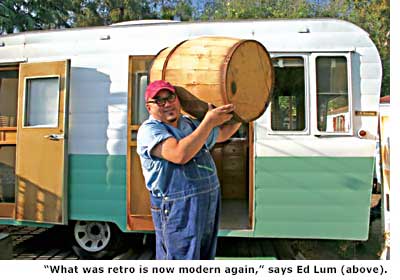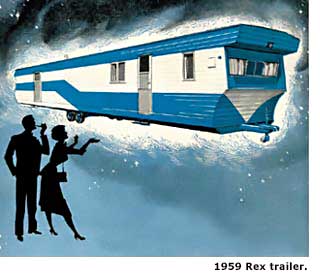On the Road Again: Trailers - Page 3
Trailers have always been modern in attitude, even more than in look. "There's this whole on-the-road American idea of freedom," Aley says. "To me," says Agnew, who takes his trailers to the desert and the sea, "it doesn't matter what kind of trailer you have, as long as you're enjoying the outdoors."
And, as Lum points out, it's their size that makes trailers seem modern today. 'Think Small,' the New York Times recently headlined a feature about the "tiny-house movement," a new generation of modular vacation homes, "seldom measuring much more than 500 square feet," that are popping up on mountains and by the ocean.
That's where Tom Carson comes in. Carson is a young architect whose Marina del Rey firm does work that ranges from residential to historic preservation—and now trailers. With Butcher, Carson is inventing "a new, ground-up, free interpretation of the trailer," he says, for people looking for a second home, a pool house, or a home office. "It's like a prefabricated home," he says, "but we're going to leave it on wheels."
"There are no modern trailers now," Carson says. "That's a huge hole in the market, and it's what we are aiming at. We're going to revolutionize the trailer industry with this new piece we're doing."
Today's trailers lack the style and character of the vintage models they love, Carson and Butcher say. "We're tired of the look of what's out there now," Butcher says. "The style of the trailer has not changed in the last 30 years. It still looks like a 1970s, '80s house." "They lost their cool look when they started going to fiberglass exteriors," he adds.
Butcher shows off some of the vintage trailers he has restored and modernized to suggest what his latest endeavor might accomplish. They've dropped floors to provide holding tanks for water and wastewater, added air-conditioning, espresso machines, I-pod docks, Tivo, computer cables, and European cabinetry. They're adding solar panels to a 1952 Spartanette and a vintage Westcraft. "We try to make it look like it was built in the '50s," Butcher says, "with a little bit more modern flair to it." "And all the comforts," Carson adds.

Movie stars have used their revamped machines as homes away from home while on location, and Hollywood writers have used them for offices.
Butcher may spend his weekdays driving for studios and weekends rebuilding trailers, but he's never been happier. "That's what we like to do," he says, "design and build. It's not about the money. It's about building something cool, something that looks good."
Photos: John Eng. Also by Douglas Keister; and courtesy Juergen Eichermueller, PhD, Funky Junk Farms
Splash illustration: Ed Lum
Resources
• Funky Junk Farms is open for tours (by appointment only) to visitors with a sincere appreciation of travel trailers and all things vintage. Call 323-309-8087, or e-mail. Web site: funkyjunkfarms.com
• The Monterey Trailer Park, a Los Angeles designated historic monument, is at 6411 Monterey Road, in the Los Angeles neighborhood of Highland Park, a few blocks from South Pasadena and just of the Pasadena Freeway.
WHEN 'WHEEL ESTATE' WENT WILD
By Juergen Eichermueller, PhD
The 'wheel estate' market of the 1950s boasted many bold designs—with big-ticket price tags to match—that rivalled some of the most modern site-built homes of the era.

The major difference between the two living spaces was that the travel trailer, or mobile home (as they were more commonly called), could be moved, usually by a special moving company, at the whim of the owner. Whereas the stick-built homeowner was tied down, literally, to the property on which their house was built, the mobile homeowner could 'get up and go' to any part of the country, and in any season.
What's more, if their budgets permitted, mobile folks could cruise the high life, hanging out at five-star-rated, landscaped mobile home parks equipped with deluxe amenities, which included heated swimming pools, tennis courts, and clubhouses.




